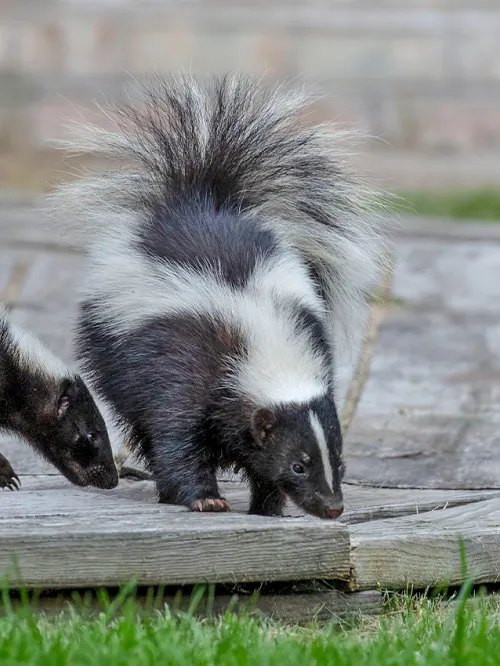Imagine walking into your home and being greeted by a pungent, unmistakable odor that instantly makes you think of skunks. But here’s the mystery: there are no skunks nearby.
You’re left puzzled, and maybe a bit frustrated, trying to figure out where that smell is coming from. You’re not alone in this perplexing situation. Many homeowners find themselves battling mysterious odors that seem to have no obvious source. The good news is, you can solve this smelly puzzle.
Understanding why your house smells like skunk, even when there are no skunks around, is essential for restoring your peace of mind and the freshness of your home. Dive into this article to uncover the hidden culprits behind that skunky smell, learn how to eliminate it, and prevent it from sneaking up on you again. Your journey to a fresher home starts here!
Common Causes Of Skunk-like Odors
Have you ever walked into your home, only to be hit by a pungent skunk-like odor, and wondered what on earth could be causing it? You’re not alone. While the unmistakable smell of a skunk is typically associated with the striped critter, there are several other culprits that might be lurking in your home. Let’s dive into some of the common causes that could be behind that distinctive, unpleasant aroma.
Household Chemicals
Sometimes, the culprit is closer than you think. Certain household chemicals can emit odors reminiscent of skunk spray. Cleaning agents, paints, and solvents are often to blame. If you’ve recently used a new product, take a closer look at its ingredients. Could it be that the smell is lingering from an open container or a spill? It’s a good idea to ensure proper ventilation and storage of these chemicals.
Plumbing Issues
Your plumbing might be playing tricks on you. Sewer gas can escape through faulty plumbing fixtures or traps, creating a skunk-like smell. If you notice the odor near sinks or drains, check for leaks or clogs. I remember a friend who discovered a similar smell, only to find a blocked drain. Addressing these issues promptly can prevent further complications.
Electrical Problems
Electrical problems can be an unexpected source. Overheated wires or faulty appliances can emit odors that resemble skunk spray. If you’ve recently installed new electrical equipment, ensure everything is functioning properly. An unusual smell might be your home’s way of signaling a potential danger. Wouldn’t it be better to check before a minor issue turns major?
Animal Intruders
Despite no visible skunks, animal intruders might be responsible. Small critters like mice or raccoons can create similar smells. Their nests or waste might be hidden in attics or basements. Have you heard any scurrying noises lately? Inspect your home for signs of animal activity and consider professional help if needed. Sometimes, the smallest creatures can be the biggest troublemakers.
Identifying the source of skunk-like odors can be a bit of a detective game. Each cause comes with its own set of signs and solutions. So, what do you think might be causing the smell in your home? Taking the time to investigate can lead to a fresher, more pleasant living space.

Credit: www.humaneworld.org
Identifying The Source
A mysterious skunk-like smell in your home could originate from a gas leak or sewer issue. Check for cracked sewer pipes or faulty gas appliances to identify the source. Ensuring proper ventilation and professional inspection can help eliminate the odor and ensure safety.
When your home suddenly smells like a skunk but there’s no wildlife in sight, it’s not just a mystery—it’s a problem that needs solving. Identifying the source is crucial to restoring freshness in your living space. By systematically examining different areas, you can unravel this puzzling scent and take back control of your environment.Room-by-room Inspection
Start your detective work indoors. Check each room, paying special attention to areas like the bathroom, kitchen, and basement. These spaces often have plumbing that could be causing the odor. Look for any leaks or moisture build-up. Mold or mildew can mimic skunk-like smells and thrive in damp conditions. Use your nose. Sometimes the simplest method—sniffing around—can lead you to the source.Checking Ventilation Systems
Ventilation systems can be a sneaky culprit. Have you checked your HVAC system recently? Filters can trap unpleasant odors, especially if not replaced regularly. Inspect air ducts. Dust and debris accumulation can emit foul smells if left unchecked. Does your home have exhaust fans? Ensure they’re functioning correctly and not clogged.Examining Outdoor Areas
Step outside. Could your garden be hiding something foul? Some plants and flowers have strong scents that might be drifting indoors. Check for dead animals in less visible areas like gutters or under decks. Decomposition can produce skunk-like odors. Walk around your property and inspect drainage systems. Poor drainage can cause stagnant water, which might be the hidden source of the smell. Have you ever encountered this baffling skunk smell? What steps did you take to find its source? Identifying the origin can be challenging, but persistence and thoroughness can lead to a fresher, more pleasant home environment.Diy Odor Solutions
Discovering a skunk-like smell in your house can be worrying. No skunks nearby? It’s time for some DIY odor solutions. These methods help keep your home smelling fresh. You don’t need expensive products. Simple techniques can do wonders.
Ventilation Techniques
Open windows to let in fresh air. This reduces the smell quickly. Use fans to circulate air in rooms. Fans help push out stale air. Consider using exhaust fans in kitchens and bathrooms. They remove odors and moisture.
Keep your HVAC system clean. Check filters regularly. Replace them when dirty. Clean filters improve air quality. They also reduce unwanted smells.
Natural Deodorizers
Baking soda absorbs odors effectively. Sprinkle it on carpets and furniture. Leave it for a few hours. Then vacuum it up. This simple trick freshens up spaces.
Use vinegar as a natural deodorizer. Place bowls of vinegar in smelly rooms. The vinegar scent fades, taking odors with it. Essential oils offer a pleasant smell. Add them to a diffuser for a fresh aroma.
Chemical Cleaners
Sometimes, stronger solutions are necessary. Choose commercial odor removers specifically for skunk smells. Follow instructions on the label. Ensure proper ventilation when using them.
Use enzyme-based cleaners for organic odors. They break down the source of smells. These cleaners work well on carpets and upholstery. Always test on a small area first.
When To Call Professionals
Strange, lingering odors can disrupt your home’s comfort. A skunk-like smell without skunks nearby is puzzling. While DIY solutions exist, some situations need expert help. Knowing when to call professionals is key. It ensures safety and resolves issues effectively.
Persistent Odors
If the odor persists despite cleaning, professional help is crucial. Persistent smells might indicate hidden problems. Professionals have tools to locate the source. They can address issues you might miss. This ensures your home stays fresh and safe.
Complex Plumbing Issues
Odors can stem from plumbing problems. Leaks or sewer gases need expert attention. Complex plumbing issues require trained professionals. They can fix leaks and prevent future problems. This keeps your plumbing system functioning smoothly.
Electrical Concerns
Electrical issues can cause strange smells too. Wiring problems might release skunk-like odors. Professionals can identify and fix faulty wiring. This prevents potential hazards and ensures safety. Protect your home and family by calling experts for electrical concerns.
Preventive Measures
The smell of skunk can be troubling. Especially when no skunks are nearby. Taking preventive steps helps keep your home fresh. These measures protect against unwanted odors.
Addressing potential issues early is vital. This keeps your living space pleasant. It ensures comfort for everyone in the home.
Regular Maintenance
Regular maintenance is crucial for a fresh-smelling home. Check plumbing for leaks often. Faulty pipes can emit unpleasant odors. Clean drains regularly to prevent buildup. This stops foul smells before they start.
Sealing Entry Points
Sealing entry points keeps odors outside. Check windows and doors for gaps. Seal cracks and holes promptly. This prevents external smells from entering. Use weather stripping for a tight seal. This also helps with energy efficiency.
Routine Air Quality Checks
Routine air quality checks ensure a healthy home environment. Invest in a good air purifier. These devices remove impurities from the air. Check air vents for blockages regularly. Clean filters often to maintain efficiency. Fresh air is key to a pleasant home.

Credit: a-z-animals.com

Credit: wildlifecenter.org
Frequently Asked Questions
Why Does My House Smell Like Skunk?
Skunk-like smells can come from natural gas leaks or sewer gas. Check for gas leaks immediately. Safety first.
Can Household Items Cause Skunk Odors?
Yes, some household items like burnt food, certain plants, or cleaning products can mimic skunk smells.
How Do I Identify A Gas Leak?
Natural gas has a sulfur-like odor. If you smell it, leave and contact professionals immediately.
Could Plumbing Issues Cause Skunk Odors?
Yes, sewer gas from plumbing issues can smell like skunk. Check for dry traps or leaks in pipes.
How Can I Remove Skunk-like Odors From My Home?
Ventilate your home, use vinegar or baking soda, and clean affected areas. Professional help may be needed.
Conclusion
Figuring out why your house smells like skunk can be tricky. Check common household items like plumbing, electrical wires, or gas leaks. They often cause skunk-like odors. Identify the source quickly to ensure safety and comfort. A fresh, clean home is possible with the right steps.
Consider professional help if the smell persists. They can pinpoint hidden issues. Always prioritize safety and health in your living space. Regular home checks prevent future odor problems. Keep your home smelling fresh and inviting. Stay alert and proactive for a pleasant living environment.
Enjoy peace of mind in your odor-free home.





